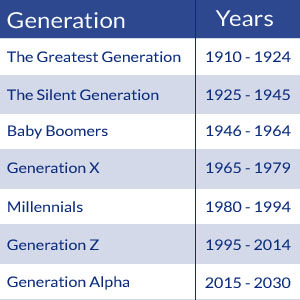Who is Generation Z and how does the appearance of this latest generation effect recruiting efforts, learning and development programs, and company culture?
The Homeland Generation. Founders. Plurals. Post-Millennials. iGeneration. Gen Z. Or, if New York Times’ readers have a say, Deltas or Generation Scapegoat. Whatever we call the generation that comes after Millennials, born around 1995 or later, the oldest are graduating from college now.
Are you ready for this next generation (we’ll refer to them  as Gen Z) to enter your workforce? What do we know about them? What does the appearance of Gen Z mean for your recruiting efforts, learning and development programs and company culture?
as Gen Z) to enter your workforce? What do we know about them? What does the appearance of Gen Z mean for your recruiting efforts, learning and development programs and company culture?
Of course, every employee is unique. For this blog, we’re using generalizations identified by researchers to characterize Gen Z as a group, highlighting how this generation is broadly different from those that came before it.
Who is Generation Z?
The early years of Gen Z were shaped by 9/11, the war on terror and the Great Recession, forging a generation that worries about the economy and is determined to take charge of their own futures. They are the first true digital natives, born to smartphones and immersed in multi-device, digital communication. They make up the largest segment of the U.S. population today and are the most multicultural of any generation to date.
Sparks & Honey created a great SlideShare, supporting characterization of this generation as:
- Digital Multi-taskers: Smartphones, PCs, laptops, tablets…. Gen Zers routinely multitask across five screens as they game, watch their favorite YouTubers, connect on social media, listen to music and collaborate on homework – all at the same time.
- Secretly Social: Though this generation is very active on social media, they shun over-sharing. They favor platforms with strict control over sharing, such as Snapchat and Instagram, and anonymous platforms like Whisper and Secret.
- Diverse: Gen Zers are diverse; many are multiracial. It’s a multicultural group coming to age at a time that gender roles and norms are blurring. Same-sex marriage is a right. Gender identity may or may not align with sex at birth. Through online connections, social circles are global – creating a generation that may have more in common with peers in another country than with adults in this one. Diversity isn’t something to study and understand; it’s a fact of life.
- Entrepreneurial: Lacking trust in traditional career paths that failed their older siblings (who may still be
 living at home) and parents (affected by recessions), this generation is overwhelmingly entrepreneurial. They value learning, yet mistrust over-priced higher educational institutions that could put them needlessly in debt.
living at home) and parents (affected by recessions), this generation is overwhelmingly entrepreneurial. They value learning, yet mistrust over-priced higher educational institutions that could put them needlessly in debt. - Information Processers: Gen Zers process information quickly, from multiple sources. They prefer bite-sized chunks and images. They can also forget information just as quickly – confident that any future need for the information is just one click away.
- Speedy Communicators: As efficient researchers and communicators, Gen Zers use social media (primarily YouTube) as a research tool and prefer to communicate with symbols and graphics. They’re known for rapid-fire banter but are not precise communicators. They can lack “real life” situational awareness (more closely tuned to the digital situation, instead).
Recruiting Gen Z Talent
Gen Z is the pipeline for your future workforce. There’s little doubt that this generation will have as much of an impact on government and industry workplaces as Millennials had before them. They embody many of the characteristics that it will take to thrive in an evolving, tech-savvy global community. To attract this next generation of talent, you’ll need to find, connect with and entice prospective employees to join your team.
- Update Job Descriptions: Be sure your job descriptions are up-to-date for the skills your next employees will need to bring or learn. Decide, too, whether non-traditional educational and work experiences may bring value to the role.
- Expunge Bias from Your Recruitment Process: It’s easy to overlook filters that inadvertently screen out the exact diversity your organization is seeking. Emphasize competencies as one way to keep your hiring process fair and effective.
- Go Where the Talent Is: Reach out to recruits online – where they are already spending much of their time. Many companies, for example, have experienced good results using Snapchat for recruiting. Just having an active Snapchat account is a gesture to Gen Z that you have a sense of who they are.
- Benefits: Unlike Millennials, Gen Zers value money and job security. Emphasize your benefits and culture that fit Gen Z employees.
Gen Z Learning and Development
On the one hand, Gen Zers love to learn and feel confident that they can get the answers they need. On the other, they have learning preferences and needs that are different from earlier generations. When you evolve your learning and development programs for the next generation, you may want to tweak some things for the best fit.
- Digital and Visual Content: These self-directed learners will expect easy online access to practical, visual content. Consider expanding your “YouTube-like” training modules, with short videos to quickly demonstrate answers to questions that Gen Z employees may have. Many short videos are better than fewer long ones.
- Reassess Your Library and Curricula: Gen Z doesn’t need to learn about diversity; they are living it. They adapt quickly to technology, so likely won’t need lengthy classroom settings to learn new applications. However, you may need to come up with courses that support soft skill development such as improving face-to-face (in person and video-based) interactions with colleagues and company leaders. Do you have a course on situational awareness? This group may need your help to “tune in” more to the physical world around them.
Building a Gen Z-Friendly Company Culture
The Gen Z culture is digitally connected yet self-driven. It’s diverse and accepting. It’s entrepreneurial, yet seeking security. As you shape your organizational culture, you’ll want to make the next generation feel welcome and productive.

- Diversity: If you aren’t already, do everything you can to embrace a diversity of backgrounds, experiences and ideas. Not only will Gen Zers feel at home, but your organization will be more productive and effective.
- Digital Connections: Make it easy to connect with colleagues across time zones, geographies and cultures. Gen Zers are excellent digital collaborators.
- Independence: That said, most Gen Z employees will be comfortable doing their work physically alone. They believe they have a lot to offer, so will have the confidence to contribute (with direction and feedback), but will shy away from meetings and working sessions to complete a project.
- Inclusion: Even though they are young, Gen Zers have a lot to offer. Look for opportunities to engage them in meaningful conversations – including global topics. Assume they have opinions. Listen.
- Entrepreneurship: Tap into the entrepreneurial spirit of your Gen Z personnel. Are there legitimate opportunities for Gen Zers to lead and build in your organization? That can be a good fit. If not, prepare to accept that a Gen Zer may have a business interest “on the side.” If a Gen Z worker is getting the job done within the timelines you agree on, it may help to think of an outside business venture as simply another skillset of a valuable employee.
Business and government leaders are constantly adapting to change and the emergence of Gen Z is just the next generational change to hit the workforce. It’s natural. It’s expected. And, somehow – despite our preoccupation with Millennials – it’s here! Are you ready? If you’re looking for ways to refresh your recruiting, learning and development, or competency management programs to prepare for Gen Z, let us know. We’d love to help!
RELATED RESOURCES:
Do You Know These Top 5 Skills of Good Managers?
Six Factors That Motivate GenZ in the Workplace
How to Develop Leadership Competencies in Your Millenials


 living at home) and parents (affected by recessions), this generation is overwhelmingly entrepreneurial. They value learning, yet mistrust over-priced higher educational institutions that could put them needlessly in debt.
living at home) and parents (affected by recessions), this generation is overwhelmingly entrepreneurial. They value learning, yet mistrust over-priced higher educational institutions that could put them needlessly in debt.
Hi,
I really like your definition of the different generations, and i would like to use your ideas in my classes, but before I do, I would really like to know how you created the age ranges for the different generations. Different research companies have different ranges, so it become difficult to decide on one authoritative source.
Carl – thank you for your comment…and you ask a great question. You’re right, different sources have different dates.
In fact, this 2018 Business Insider article mentions that “The only generation officially designated by the US Census Bureau is the baby-boomer generation.” And they acknowledge that the dates may shift when they say, “Here’s how Pew officially categorizes the generations by birth year at this point in time.”
When writing this blog, we looked at a variety of current article and sources to select our dates. Even then, we presented Gen Z with: “Whatever we call the generation that comes after Millennials, born around 1995 or later,” since there was not complete agreement.
So…the dates may shift a couple of years, depending on the source and timing, but the birth years are representative of the dates that are generally accepted at this time.
Hope that helps!